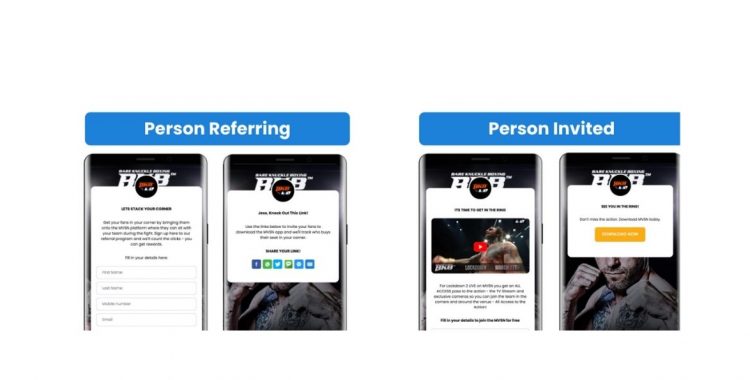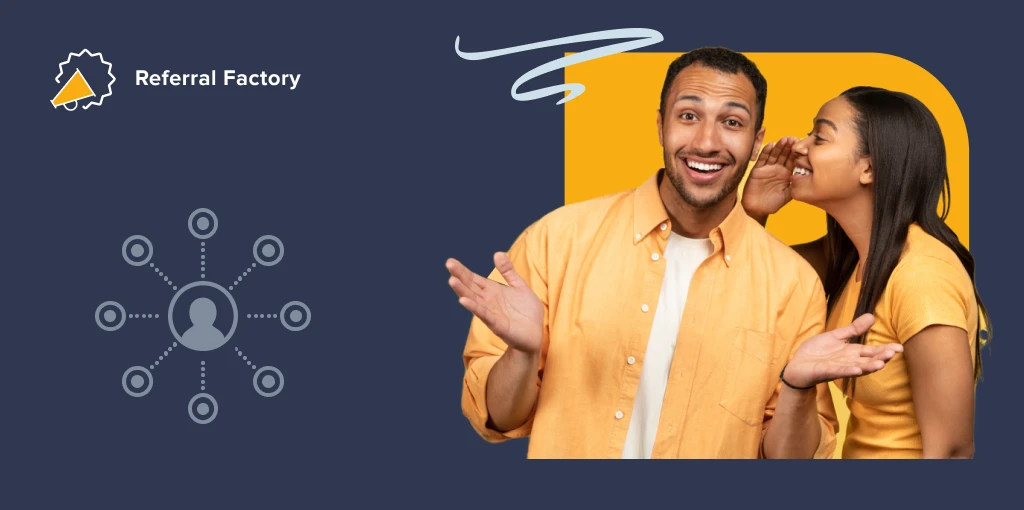Referral Rewards: What Works Best and How Much To Spend To Get Results
Referral rewards have become a popular tool for businesses to attract new customers through word-of-mouth marketing. A referral reward is a type of incentive that businesses offer to their existing customers for referring new customers to them.
Offering rewards to your loyal customers in return for them spreading the word about your brand is a simple but super effective way to encourage referrals and drive sales. Knowing what and how much to reward your customers with is a little more complex, though. Customer referrals can be different depending on how you set your referral program rules.
If you don’t already have a referral program to promote your referral rewards, then you can make one using the tool below 👇
That’s why we’ve created this comprehensive guide that will help you calculate the ideal reward value for every referral sent your way. Plus, we’ll help you find the most efficient ways to track and distribute your rewards using referral software.
Let’s get started!
Table of Contents
Key Takeaways
- Choose wisely from cash, discounts, or exclusive items. Consider preferences to enhance the appeal to your network. Your customers may refer more if the reward gets better with every successful referral they bring you.
- Accurately calculate rewards by considering conversion rates, referral frequency, and actual worth.
- Harness the power of referral programs effectively. Learn the strategies to maximize your referrals by carefully choosing the rewards for both existing and new customers.
- Referral rewards build lasting relationships. Successful referral programs rely on stable relationships with the customers.
What Are Referral Rewards?
Referral rewards are incentives given to customers who refer new clients to a business, typically in the form of discounts, cash bonuses, or free products, to encourage word-of-mouth promotion and customer acquisition. This is the essence of referral marketing.
A successful referral program makes it easy for your referring customer to invite their friends and family, and it also makes it easy for your marketing team to track and reward those referrals. A simple, unique referral link can be enough.
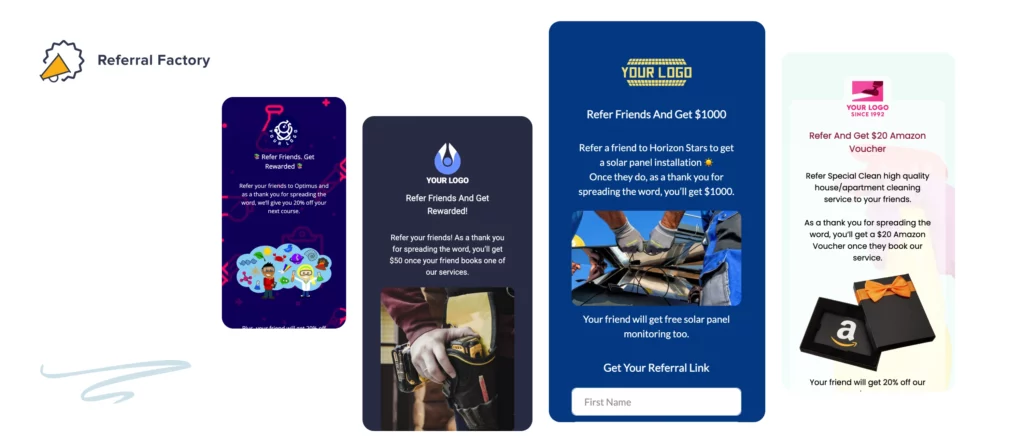
The key to any referral marketing strategy is adding the element of rewards and incentives. Referral marketing programs that use tangible rewards to motivate the paying customer usually become highly successful. People make a repeat purchase and willingly invite friends and family.
Rewards motivate your customers to actively refer your business and show them that you value their participation in your referral program.
Incentives motivate the friends who are referred to buy, sign up, or try out the brand.
This win-win solution is the simplest way for your business to get referrals, and in referral marketing terminology, this is called a double-sided referral program.
Ensure your referral program delivers smart, positive experiences to customers on their journey toward brand advocacy.
In other words, make sure your referral program is simple to use, easy to understand, has compelling messaging and imagery, and communicates the benefits and incentives of the referral program clearly.
Once your referral program is live and you start getting referrals, spread the word about it to as many people as possible.
Single or Double-Sided Rewards: What’s Best?
There are two ways a referral program can be built, either as a single-sided or double-sided referral program.
A single-sided referral program offers one user a reward or incentive, and a double-sided referral program is where both the person referring and the person invited (the “friend”) will get a reward or incentive. The double-sided rewards are more inherent to successful referral programs.
Data from the top 1000 referral campaigns run on Referral Factory in 202 shows that double-sided referral programs perform 2.4x better than single-sided referral programs. The reason for this is simple: the incentive for the person being invited is actually the most important factor that motivates the person referring. Even if it is the same reward for both parties.
Your customers will feel much more comfortable referring their friends if they know they can give their friends something, too. No matter whether your incentives are cash or discounts, a reward program will bring you more people in.
It changes the whole dynamic from someone hard selling your business to their friend to someone offering their friend a killer deal. Then, once a referred friend receives a reward, you can expect more people to come from his/her side. But that’s not the only benefit of adding an incentive to your referral program.
If a friend or family member receives a discount or incentive of sorts, it increases the likelihood that they will act now and choose your brand over another. The first purchase might be just the start of a loyal relationship.
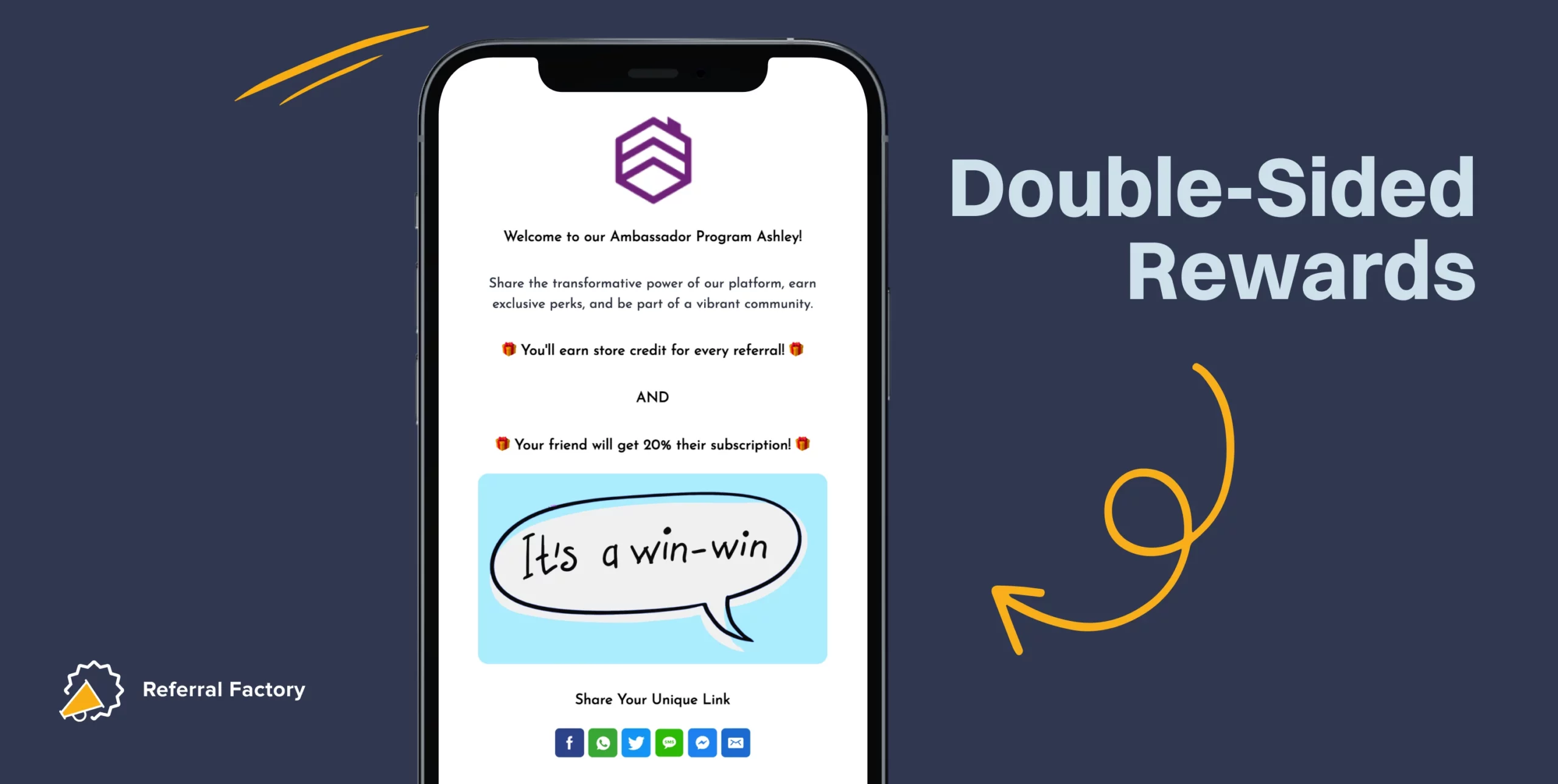
How Do Rewards and Incentives Differ In Referral Marketing?
A reward is given as a “gift” to thank your customer for successfully referring your business.
An incentive motivates the person invited (hopefully your next new customer) to complete a desired action like buying, booking a demo, etc.
While rewards and incentives can be almost anything you can think of, rewards that work best are those that drive the maximum adoption of people to use your referral reward program.
Think about what your current and new customers would be excited about, and make sure to align your reward with your business values – so that you attract the right kind of behavior and prospects with your referral program.
How Customer Data Can Help You Calculate The Value Of Your Reward
Today’s modern marketer must be data-driven, making informed decisions backed by real customer data. With so much data available, calculating the lifetime value of your customers and how much it costs your business to get those customers is really not as complicated as it sounds.
Using the value of your customer and the cost of your customer acquisition will make it that much easier to work out what the value of your referral reward should be. Once you have this data, you can make an informed decision as to what the value of the reward should be.
By offering a reward that is proportional to the value of the newly acquired customer, you can ensure that your referral program is cost-effective and provides a good return on investment.
How Do I Calculate The Value Of My Customer?
While this sounds very technical, it really isn’t, and again important to note that the value doesn’t have to be perfect.
Working with a pretty close estimation of the value of your customer or the lifetime value of your customer will still help you get close to the ideal value of your referral reward.
To work out the value of your customer, you use their average purchase value multiplied by the average number of purchases. It goes without saying that the first purchase should be translated into the next one.
So the formula will look like this: Customer Value = Average Purchase Value * Average Number of Purchases.

Once you have your customer value, you can dive deeper into working out your customer’s lifetime value by using the customer value multiplied by the average customer lifespan.
The formula will look like this: Customer Lifetime Value = Customer Value * Average Customer Lifespan.

As a marketer, you will know that these basic customer calculations are crucial to everything you do, from planning new campaigns to working out the return on investment. Referral marketing is no different.
How Do I Calculate The Value Of My Referral Reward?
There are two approaches you can use to calculate what the value of a referral reward should be.
The thing you need to consider is the cost of the reward for your existing customers, as well as the cost of the incentive for the friends who have been referred. The first approach is to figure out the lifetime value of your customer. From there, it’s really as simple as understanding that the value of your referral reward and incentive should be, at most, 10x lower than the lifetime value of your customer.
This is because your acquisition cost should always be, at most, the lifetime value of a customer, or you’d be losing money. The second approach is much more straightforward and what I see most businesses use as a starting point.
Quite simply – you make your referral reward and incentive cost equal to your current average cost to acquire a customer. Note: this is your cost to acquire a converted customer, not a lead.
If you know what your overall acquisition cost of a new customer is, you can simply take this cost and split it between the person referring and the person invited. Give $100, Get $100, for example.
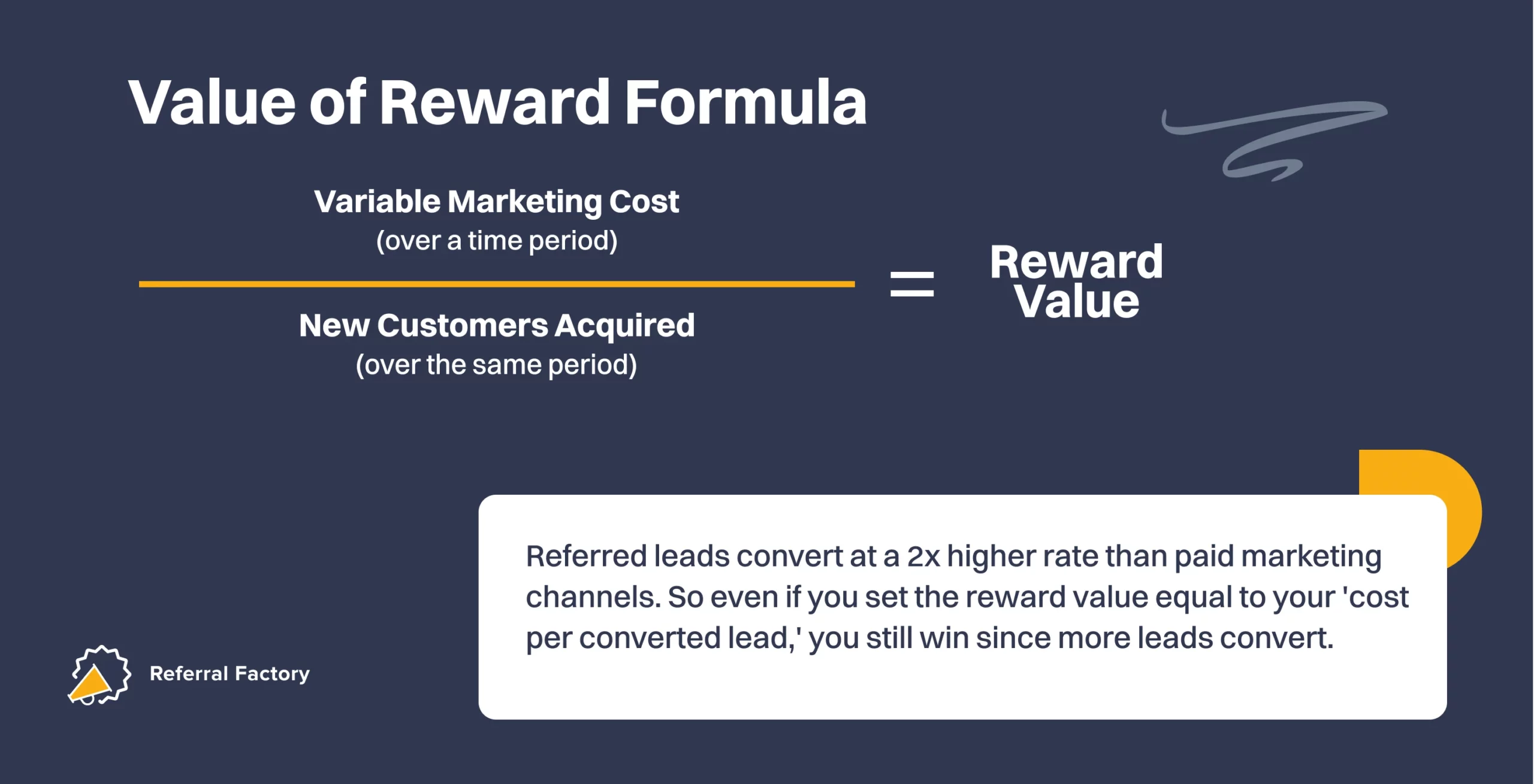
For example, Let’s assume your current cost to acquire a customer is $100. You could split this and give $50 to the person referring and $50 to the person invited.
This way, your cost to acquire a customer stays the same, but you can earn way more of them for less work. Why? Because referred leads are 2x more likely to convert than leads acquired through paid marketing channels.
Your referral program should be profitable, and the value of your reward and incentives should make sound commercial sense to your business. Make your referral reward and incentive too low, and you run the risk of driving low engagement in your referral program, which will make your referral program ineffective.
But at the same time, understand that a referral reward that is too high in value can also be a problem as you will be spending more money acquiring a customer than you make from the customer, and in the long term, this can put you in financial hot water. If you are working with brand advocates, consider giving them a special advocate reward.
This is why finding the ideal middle ground is the only way to reach the right balance.
What Are The Best Referral Rewards?
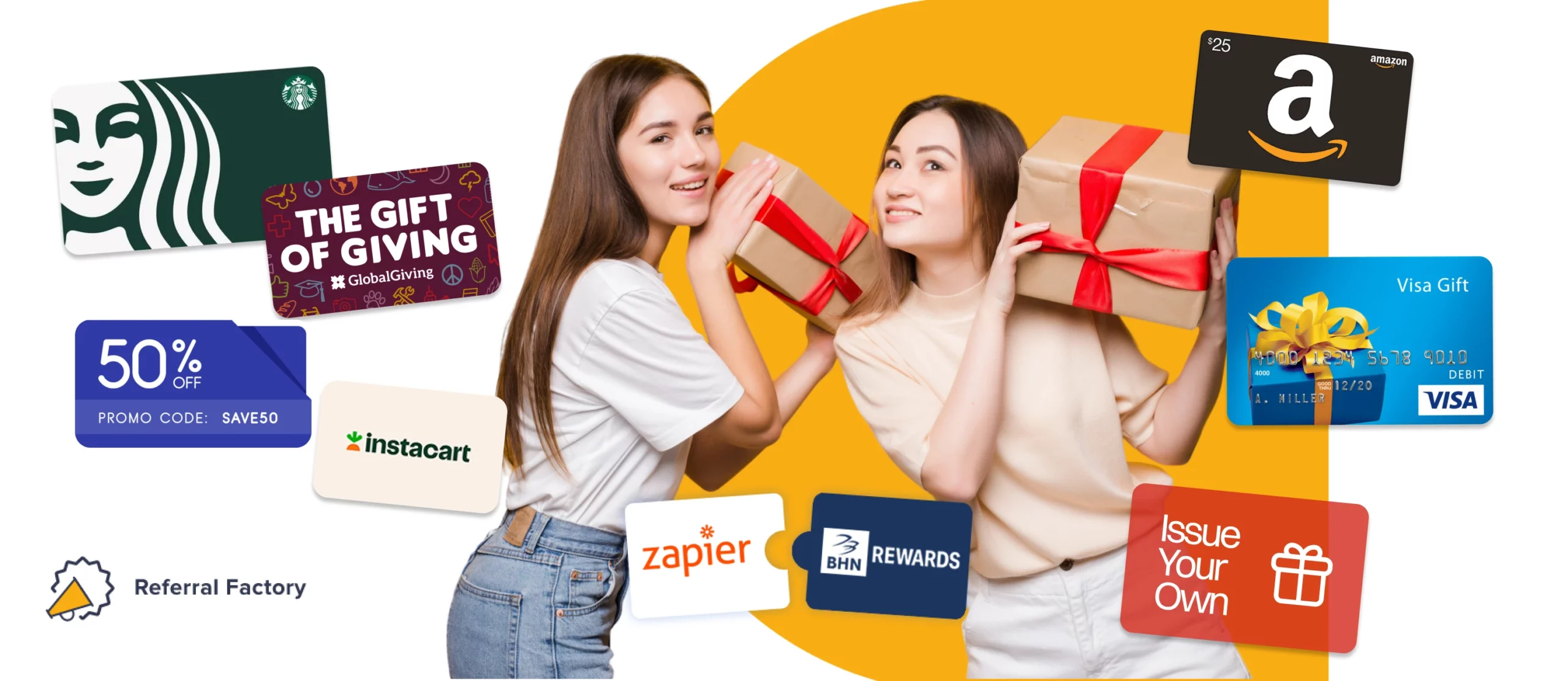
Referral programs that drive the most profitable growth are those that reward customers but also reward you as the business.
What do I mean by this? A reward that adds value to your existing customer and generates revenue for the business. We refer to this as rewarding in your own currency.
While there is no right or wrong answer when it comes to selecting a referral reward or incentive, a reward in your own currency that drives customer acquisition and retention is what often makes the most sense. Note that if you want to issue your own reward – make sure the referral marketing software you use supports this feature seamlessly.
But on the flip side, you also need to consider what is also good value for your customer and what your customer actually wants.
If your product or service is not something they use frequently, then offering a reward on your own currently might not be best; in this case, it may be better to offer a digital Visa cash card or a gift card like Amazon. Think about what reward or incentive will encourage people to actively participate in your referral program, essentially becoming advocates for your brand. Issue a separate advocate reward.
Ultimately, the best referral rewards and incentives depend entirely on your business and your customers’ preferences. Consider running two referral campaigns to test different rewards and incentives, essentially tracking their effectiveness to determine which ones are most effective.
Here are some customer referral program ideas:
Cash Rewards
Cash rewards stand out as one of the most successful referral incentives due to their simplicity, versatility, and universal appeal.
Even a modest sum, such as $5, can profoundly motivate customers. The appeal lies in its practicality and scalability — whether you invite 3 friends or 30,000, cash rewards remain valuable and enticing. Best referral programs show that many referred customers after receiving a cash reward, tend to become loyal customers.
Moreover, cash rewards are easily automatable, streamlining the referral process. This approach not only fosters customer satisfaction but also bolsters the potential for product reselling, especially for items with extended purchasing lifecycles.
Cash rewards, being universally desired, ensure a high participation rate in referral programs, making them a cornerstone for customer acquisition strategies.
Discounts (Products, Goods, or Services)
Discounts on products, goods, or services present a compelling referral reward strategy. Customers are naturally drawn to the prospect of saving money on items they desire.
Offering exclusive discounts not only entices potential customers but also incentivizes existing ones to refer others. Customer referral programs rely on these rewards heavily.
The appeal lies in the tangible value recipients gain — a direct reduction in the cost of products or services.
This approach fosters immediate engagement, driving sales while creating a sense of loyalty among referrers. It is also very easy – a referral code (or link) is enough to receive the reward.
Furthermore, it promotes your offerings effectively, turning satisfied customers into brand advocates, thus amplifying your reach and customer base.
Rewards Points (Loyalty Program Points)
Rewards Points, integrated into a loyalty program, serve as a powerful referral incentive. By allowing customers to accumulate points through successfully shared referral links, businesses create a system where loyalty is rewarded.
These points translate into tangible benefits, encouraging customers to refer others for the prospect of exclusive deals or complimentary items.
The allure of earning points that lead to substantial discounts or coveted products fosters continuous engagement.
This approach not only fuels customer retention but also leverages the psychological satisfaction of accruing rewards.
It transforms successful referrals into a seamless part of the customer journey, encouraging long-term relationships and active brand advocacy within the existing customer base.
Exclusive Access
Exclusive access stands as an enticing referral reward among referral incentives, offering a sense of privilege and belonging.
By granting referrers access to limited editions, special events, or members-only content, businesses create a feeling of exclusivity.
This motivates customers to refer others, desiring the unique experiences or products available only to insiders.
Exclusive access not only strengthens customer loyalty but also fuels a sense of community, enhancing the brand’s allure and fostering genuine brand ambassadors.
Gift Cards
Gift cards serve as versatile and attractive rewards, a very good type of referral incentives. It provides recipients with the freedom to choose their desired items.
These prepaid cards offer a wide selection, catering to diverse preferences, ensuring the reward resonates with a broad audience.
Additionally, they simplify the referral process, making it easy for referrers to share a universally appealing incentive.
Free Products
Who doesn’t like free things? This approach not only delights customers but also allows them to experience the brand’s offerings firsthand, creating a profound sense of trust and satisfaction.
By enabling customers to enjoy complimentary items, businesses create a positive and memorable experience, reinforcing their relationship with customers. Successful referrals are often brought by free products.
This not only encourages referrals but also solidifies customer loyalty, making it a powerful strategy for building a dedicated customer base and driving genuine brand advocacy.
Providing customers with the opportunity to try out products without any cost not only enhances their perception of the brand but also nurtures a long-lasting connection, resulting in increased customer engagement and a stronger brand presence in the market.
What’s The Average Amount Of A Referral Reward?
The answer to this question varies depending on the industry, the type of business, and the specific referral program.
Generally, referral rewards range from a small discount or free product to a significant cash bonus.
For example, in the retail industry, referral program examples show that the reward may be a 20% discount on the next purchase for the existing customer and the new customer.
On the other hand, in the financial industry, referral rewards may be much higher, ranging from $100 to $1,000 or even more.
Often, a customer referral program may offer tiered rewards based on the number of referrals or the value of the new customer’s purchase.
For instance, a business may offer a $50 reward for the first referral, $75 for the second, and $100 for the third and subsequent referrals. Thus, the value per referral can be significant.
Spoiler alert: data does show that tiered referral programs tend to perform poorer than simple customer referral programs.
This is because keeping it simple makes it easier for everyone: one referral = one reward. Easy to read, easy to understand, easy to follow.
It’s important to note that the amount of a referral reward should align with the value of the new customer to the business. A high-value customer may warrant a higher referral reward than a low-value customer.
The average amount of a referral reward varies widely based on the industry and the specific referral rewards program.
As a business, it’s important to carefully consider the value of a new customer and offer a referral reward that is both attractive to existing customers and aligned with the business’s goals.
Testing different rewards and incentives through multiple referral campaigns can also help determine what works best for your business and customers.
With the right referral rewards and incentives, businesses can encourage their customers to become brand advocates and drive new business through word-of-mouth marketing.
Choosing Incentives For Referrals
Selecting the perfect incentives for a refer-a-friend program is a critical decision that can significantly impact its effectiveness.
When it comes to choosing incentives, it’s not just about offering rewards; it’s about creating a compelling proposition that resonates with both your existing customers and potential referrals.
Here are some essential factors to consider when deciding on the right incentives for your referral program:
Relevance to Your Audience
Consider the demographics and preferences of your target audience. What motivates them?
What kind of rewards would they find valuable?
Let’s take a look at referral program examples. Say, if your business caters to tech-savvy customers, offering exclusive access to new features or early product releases might be highly appealing.
Understanding your audience’s needs and desires is fundamental in selecting incentives that attract their attention. This will later bring you more value per referral.
Value Proposition
The referral incentives you offer should provide genuine value to both the referrer and the referee.
Customers are more likely to participate in a referral program if they believe the reward is worth their effort. Otherwise, they won’t click on that referral link.
It could be a significant discount, a free trial of your premium services, or even a complimentary product.
The perceived value of the incentive plays a vital role in motivating customers to engage in your referral program actively.
Alignment with Brand Identity
Your chosen incentives should align seamlessly with your brand identity and values. If your brand is known for its eco-friendly approach, consider offering environmentally conscious rewards, such as reusable products or sustainable merchandise.
When the incentives reflect your brand ethos, they reinforce the positive image customers have of your business, enhancing their loyalty and advocacy. A customer referral program that does not replicate your brand identity may be confusing.
Testing and Analysis
Implement A/B testing with different incentive structures to understand which ones yield the best results.
Analyze the data meticulously, focusing on metrics like referral rates, conversion rates, and customer engagement.
A data-driven approach allows you to identify the incentives that generate the highest number of referrals.
By continuously analyzing the performance, you can refine your incentive strategy, ensuring it remains effective and competitive. Thus, you will be able to refine your customer referral program.
Simplicity and Transparency
Complex reward systems can confuse customers and discourage participation. Keep your incentive structure simple and transparent, and you will receive more new customers per referral.
Clearly communicate the terms and conditions of the referral marketing program, ensuring customers understand the rules and benefits.
Clarity instills confidence, encouraging a customer to refer a friend and family without hesitation.
Personalization and Customization
Consider personalizing incentives based on individual customer preferences and behaviors.
Tailored rewards demonstrate that you value each customer’s unique relationship with your brand.
Implementing a tiered reward system where loyal, repeat customers receive exclusive benefits can foster a sense of appreciation, strengthening their commitment to your business.
What Are Tiered Referral Rewards?
Tiered rewards refer to a system where customers receive different rewards or incentives depending on how many referrals they make.
Essentially, the more successful referrals a customer makes, the greater the rewards they can earn.
I would strongly advise against this mechanic, though tiered rewards tend to confuse the users participating in your referral program, and they don’t actually encourage them to refer any more than the simple 1 referral = 1 reward mechanic.
Here’s an example of how a tiered rewards system might work in a referral program:
✅ Tier 1: The customer earns a small reward, such as a discount code, for referring one friend to the business.
✅ Tier 2: If the customer refers two friends, they receive a slightly larger reward, such as a free product or service.
✅ Tier 3: If the customer refers three or more friends, they receive the largest reward, such as a cash prize or a significant discount on a high-value product.
By offering tiered rewards, businesses can gamify the referral process for the customers participating and essentially make it fun to spread the word about their products or services.
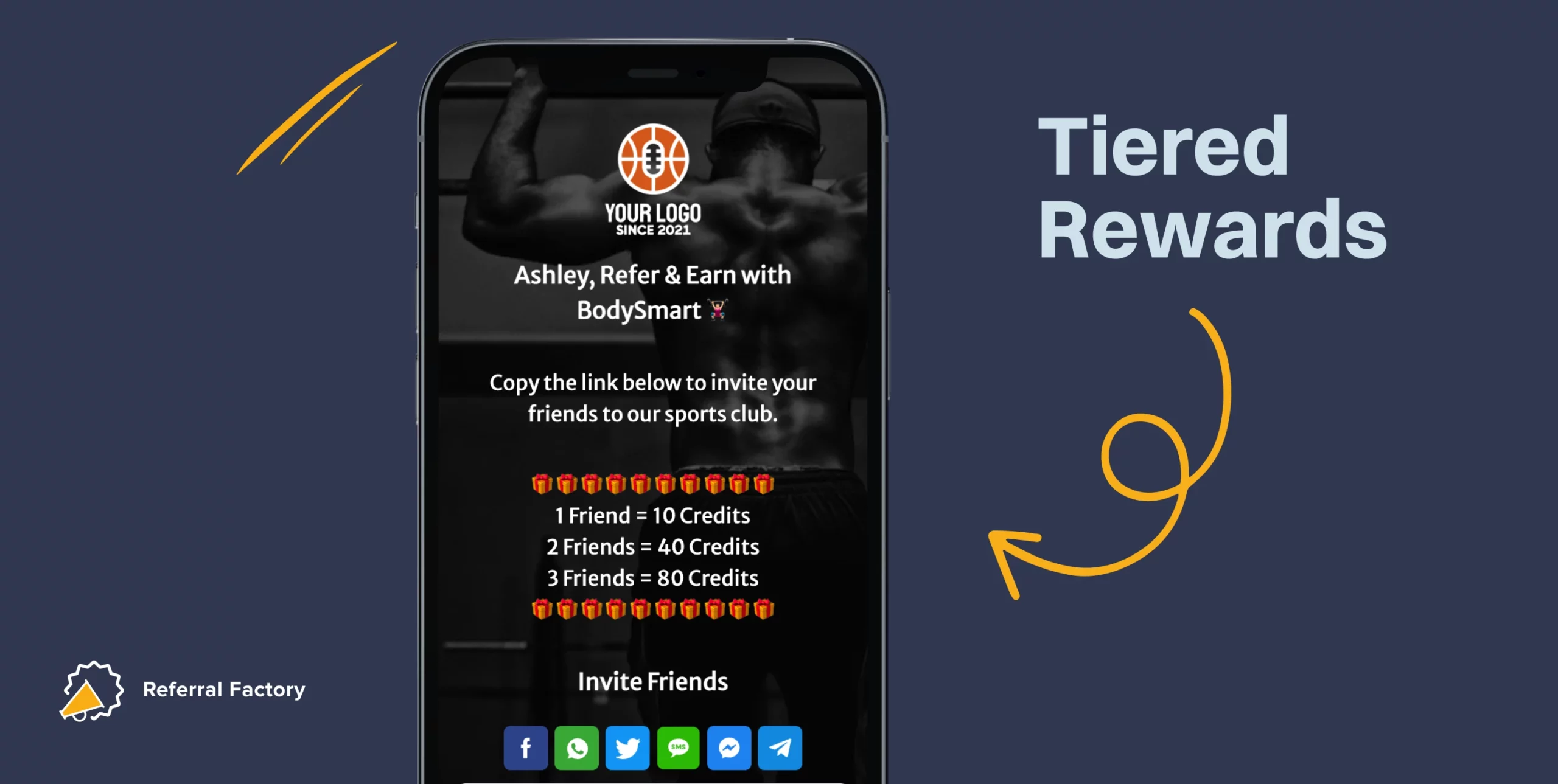
Although they are not my preference, tiered rewards can be an effective way to motivate customers to refer their friends, but it’s important to make sure the rewards are valuable enough to encourage customers to continue referring people.
No caps, hats, and water bottles as rewards, please! If the rewards are too small or useless, customers may not feel motivated to participate, while if they are too large, the business may end up losing money on the referral program.
Finding the right balance is key to creating an effective and sustainable referral program with tiered rewards, and giving enough credit to every single person referring per referral they bring.
Are Referral Rewards Taxable?
Referral rewards refer to the incentives or monetary benefits offered to individuals for recommending others to a company’s products or services.
In most cases, referral rewards are taxable as they are considered as taxable income under the Internal Revenue Service (IRS).
According to the IRS regulations, any income from sources such as bonuses, commissions, and rewards is considered taxable.
The value of the reward is included in the recipient’s gross income for the year in which it is received and is subject to federal income tax, Social Security tax, and Medicare tax.
However, if the reward is in the form of a gift or non-cash item, it may be exempt from taxation if it meets the IRS gift criteria. Generally, gifts with a value of less than $15,000 per year are not taxable.
It is essential to note that the responsibility of reporting referral rewards as taxable income falls on the recipient of the reward. Failure to report referral rewards as taxable income could lead to penalties, fines, and interest on unpaid taxes.
In summary, referral rewards are typically taxable income, and the recipient should report them as such on their tax return. If the reward is a non-cash gift valued below $15,000, it may be exempt from taxation.
It is advisable to consult a tax professional to understand how to report referral rewards accurately and comply with the IRS regulations.
Where Do I Get Started With My Referral Program?
Nobody starts anything new without proactively researching the topic, task, or technology they are looking to try. So, the fact that you have asked this question means you are off to a great start.
A good understanding of referrals, rewards, and your customers will help you model your referral program, determine what your reward should be, and calculate the value of the reward that should be given to drive more referrals.
The best place to start is to find referral program software that is the right fit for your business.
Here are some top tips to consider when making your decision:
⚡ Choose referral software that makes building, launching, promoting, and managing your referral program as easy as possible.
⚡ Look for a platform that allows you to offer a referral link to your customers rather than a referral code. Codes always end up a mess because the person invited loses them or forgets to enter the code at checkout. Links are also easier for people to share and can be customized to act as personal invitation pages for each of your referrers.
⚡ Opt for a no-code, no-developer solution that allows you to build landing pages and customize the design and style of your referral program to look and feel just like your brand.
⚡ Choose referral software that also offers seamless integrations; in most cases, this would be an integration with your CRM. This helps you manage your referral program while keeping your workload to a minimum.
⚡ Another non-negotiable feature that your referral software should have is advanced referral tracking and analytics. The ability to easily monitor the performance of your referral program and identify areas that you can improve on is vital to the success of your referral program. Make sure you can track the conversion rate of your referrals easily, as this is a key metric to measure the true impact of your referral program.
⚡ Of course, you should look for referral software that has the functionality to automatically issue rewards to your referrers and their friends. This will save you so much time and help you streamline your referral program to be more efficient.
What’s One Thing Everyone Should Know About Referral Rewards?
There is no right or wrong referral reward, value, or type. Great marketers will know what to offer by gut instinct, and others will be able to choose from popular rewards inside their platform of choice.
One of the biggest lessons I’ve learned from running hundreds of referral campaigns is that people are driven by giving more than they are getting.
The refer a friend programs that I have seen perform the best and get the most referrals are those driven by a great incentive rather than a great reward.
People feel more comfortable receiving when someone else is getting something, too. So, splitting a referral reward as an equal value exchange where everyone gets something will drive more people to join your referral program. If you prepare something for both parties, they will be more prone to use your referral code or referral link to get more referrals. What is more important, it won’t stop on the first purchase.
Best Referral Program Examples
Referral programs are key to successful marketing, and some businesses have mastered the art of driving customer acquisition and brand loyalty. Here are some standout examples:
🎯 Dropbox: Simple and effective, Dropbox offers free storage to both the referrer and referee, driving significant user growth.
🎯 Airbnb: Airbnb’s mutual benefit approach offers travel credits to referrers and discounts to friends. The referral incentives they use expand its global customer base.
🎯 Tesla: Tesla’s exclusive referral program rewards owners with perks like free Supercharging, fostering a sense of community among enthusiasts.
🎯 Uber: Uber’s instant gratification referral program. By clicking on a referral link, the company provides free rides to both parties, transforming the ride-sharing industry.
🎯 PayPal: PayPal’s referral program is pretty simple: once your friend signs up and spends at least $5 via the platform, you both receive $10. Rewards are typically paid within 24 hours. PayPal’s cash rewards for referrals spurred rapid user growth, highlighting the power of monetary referral incentives.
Are Referral Programs Expensive To Implement?
No, not anymore.
Many business owners still believe that referral programs are expensive and technical to get up and running.
This is because, in the past, building, managing your own referral program (as well as tracking it) was a costly and technical exercise because you had to hire developers to build and maintain the system.
But times have changed; with the rise of referral software tools, you can get your entire referral program (including tracking) up and running without writing a line of code. You can run any referral campaign with ease.
Heck. You can even automatically generate referral links using AI now!
If you’re considering launching a referral program and looking for a tool to build and manage it, take a look at the table. This shows what referral tools are currently trending with real buyers of referral software.
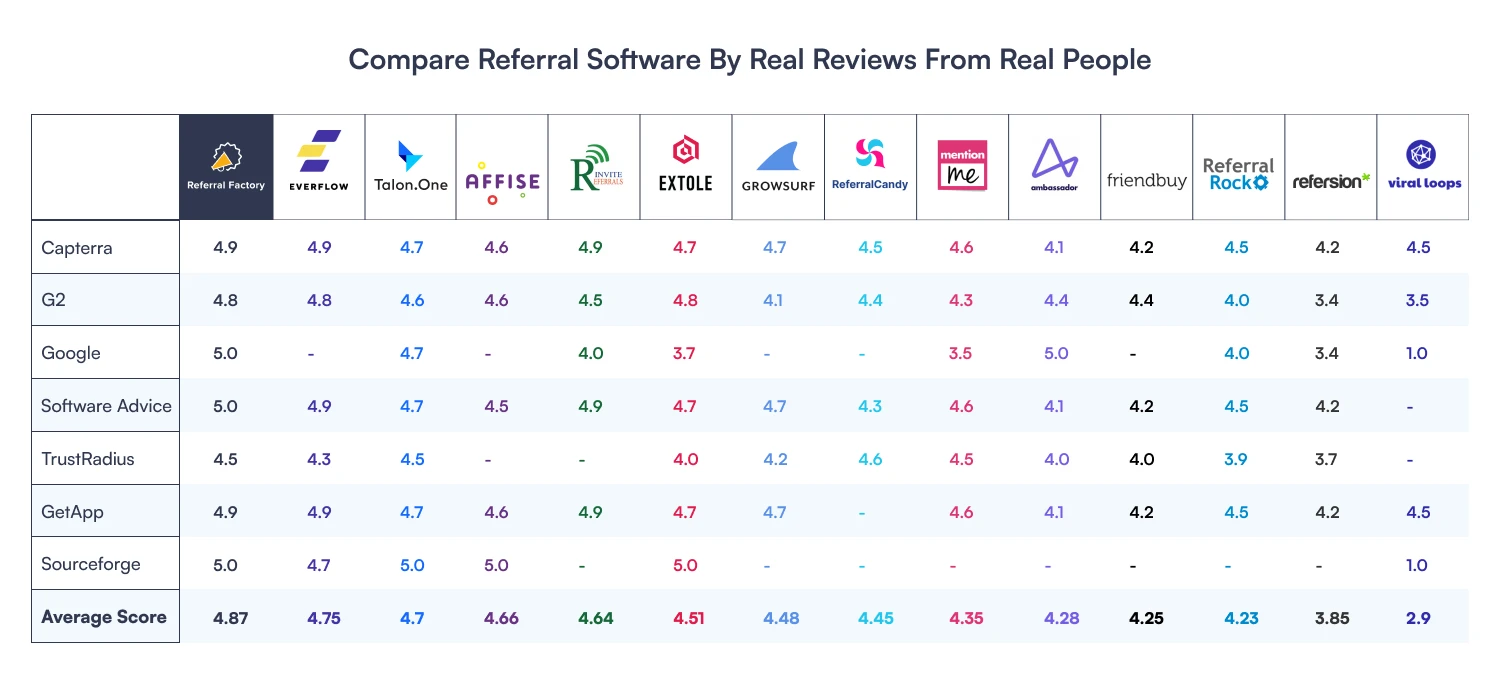
Referral programs can now be implemented cost-effectively and straightforwardly, regardless of the size of your business. You can give the reward after the referrals sign up.
Costs range from around $100 to $900, depending on the number of users you are referring.
Since the price and difficulty of launching a referral program have declined, the industry has seen a mad rush of startups, SMEs, and even enterprises attempting to automate word-of-mouth referrals.
These businesses are looking for more high-quality referrals that convert into customers, they offer custom rewards, and incentivize a referred friend as well as a person invited.
Why Use Referral Programs?
Referral programs offer many benefits for businesses that outweigh any initial costs or concerns about their expense.
Here are several compelling reasons why utilizing referral programs can be a wise investment:
🔥 Cost-Effective Customer Acquisition: Referral activities are often one of the most cost-effective methods for acquiring new customers. Since your existing customers are doing the marketing for you, the acquisition cost per referred customer is typically lower compared to traditional advertising.
🔥 Quality Leads and Increased Conversions: Referred customers tend to be high-quality leads with a genuine interest in your products or services. They are more likely to convert into paying customers and have a higher lifetime value per referral.
🔥 Enhanced Trust and Credibility: Recommendations from friends or family carry a significant level of trust and credibility. Referral programs leverage this trust, making potential customers more inclined to engage with your brand. If you have a lot of loyal customers, they are always capable of bringing you more.
🔥 Strengthened Customer Loyalty: Referral programs not only reward referrers but also encourage continued engagement with your brand. This can lead to higher customer retention rates and increased customer lifetime value.
🔥 Expanding Customer Base: By harnessing the network of your existing customers, referral programs enable you to tap into new markets and customer segments that you might not have reached through traditional marketing efforts. Best referral programs allow businesses to penetrate new markets, where referral incentives motivate people to invite friends and family.
🔥 Measurable Results: Many referral program platforms offer analytics and tracking capabilities, allowing you to measure the program’s performance and make data-driven adjustments for optimal results. You can better understand when a new referral signs up and who shares referral links with whom.
🔥 Viral Growth Potential: A well-executed referral program has the potential to go viral, especially if the rewards are enticing. This can lead to exponential growth as your customer base multiplies organically. Simplicity helps – you can use a simple referral link or a referral code, that’s it.
🔥 Brand Advocacy: Referral programs can turn satisfied customers into brand advocates who actively promote your products or services. This not only helps with customer acquisition but also strengthens your brand’s reputation. An advocate reward should be different, though, than typical referral program rewards. After all, you want to create even stronger relationships. Yet, don’t change the general rule here – keep both a friend offer and an advocate reward.
See How Many Referrals You Can Get
Based on the number of people you have to ask for referrals (these people could be customers, fans, or employees), you can calculate how many referrals you can get by launching a referral program. As well as how much value you get per referral.
Referral Factory has launched the calculator below to help you estimate how many referrals you could get by implementing referral marketing tactics in your business. You can find the referral calculator here.
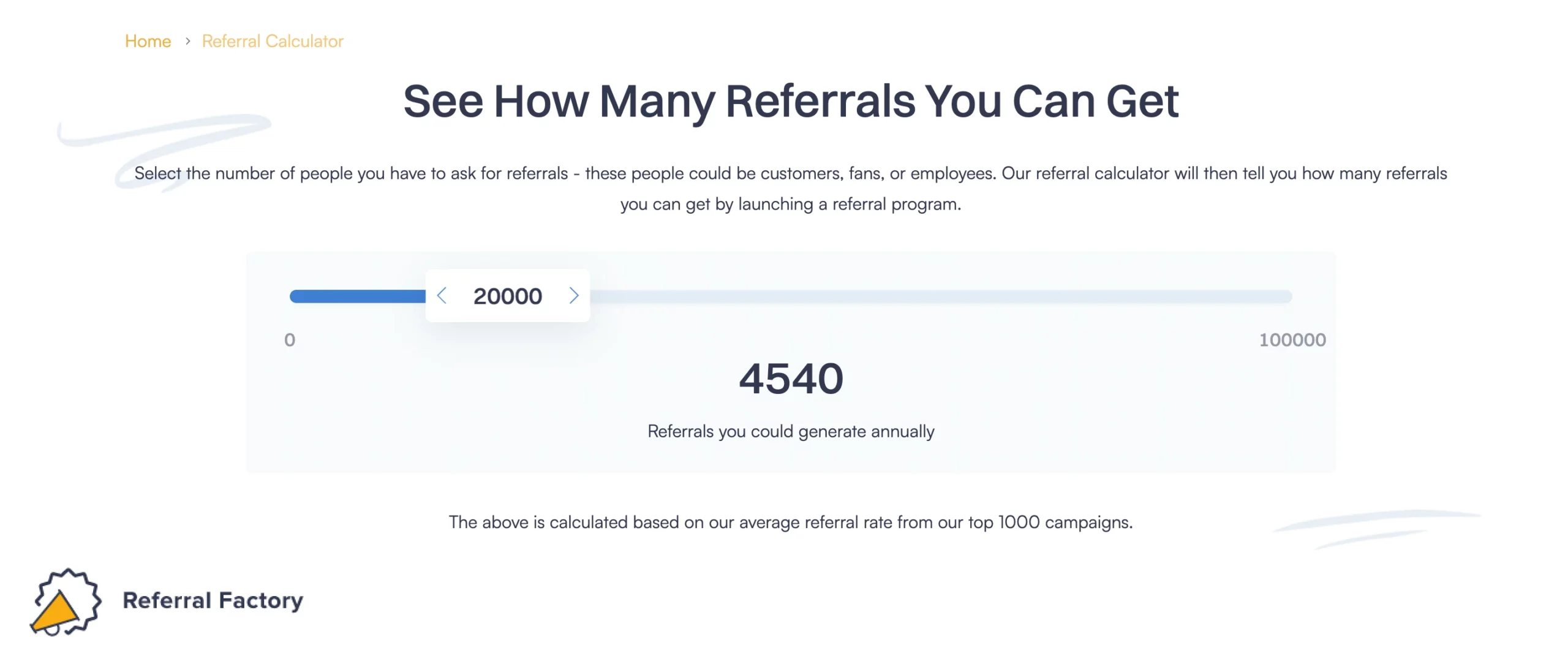
To Sum Things Up
Offering your business so much more than just customer acquisition, refer a friend programs also help to strengthen customer relationships over time, bringing more value per referral.
Great referral rewards (if you issue your own) also encourage return purchases from customers who haven’t shopped from you in a while.
Overall, launching a referral program can help you grow your business exponentially. It’s an attractive marketing tactic for good reason.
You’ll not only be able to acquire new customers on auto-pilot, but you’ll also be generating brand awareness as people spread the word about your business to their friends, family, or networks.
FAQs – A Few More Questions
What is ‘to reward referrals’?
‘To reward referrals’ – is the practice of offering benefits or bonuses to individuals who successfully refer new customers, clients, or contacts to a business. These rewards serve as a way for businesses to encourage their existing customers or associates to recommend their products or services to others.
How do you incentivize referrals?
Incentivizing referrals is achieved by offering appealing rewards, simplifying the referral process, personalizing incentives and recognizing top referrers. These strategies encourage individuals to actively refer others, boosting customer engagement and expanding a business’s customer base.
What is a referral fee reward?
A referral fee reward is a monetary incentive given to individuals who refer new customers to a business. This fee is typically a percentage of the referred customer’s purchase value or a flat monetary amount. Referral fee rewards are commonly used in affiliate marketing programs, where affiliates earn commissions for driving sales through their referrals.
How effective are referral bonuses?
Referral bonuses are highly effective in driving customer acquisition and sales. By leveraging personal networks and trust, these bonuses motivate customers to refer others, leading to higher conversion rates. Additionally, they enhance customer loyalty, making acquired customers more valuable.


